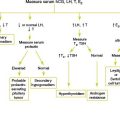Chapter 9 CHEST PAIN
Causes of Chest Pain
• Angina/coronary artery disease
• Aortic or subaortic stenosis
• Dissecting aortic aneurysm (in Marfan syndrome)
• Breast-related causes (adenocarcinoma, fibrocystic disease, gynecomastia, mastitis, thelarche)
Key Historical Features
Key Physical Findings
 Vital signs, including blood pressure
Vital signs, including blood pressure
 Note interaction between the child and parent
Note interaction between the child and parent
 Examination of the chest for signs of injury and symmetry
Examination of the chest for signs of injury and symmetry
 Palpation of the entire thoracic cage for tenderness
Palpation of the entire thoracic cage for tenderness
 Palpation of the precordium for signs of cardiac disease
Palpation of the precordium for signs of cardiac disease
 Cardiac examination for abnormal heart sounds or murmurs
Cardiac examination for abnormal heart sounds or murmurs
 Pulmonary examination for evidence of accessory muscle use, infection, effusion, or bronchospasm
Pulmonary examination for evidence of accessory muscle use, infection, effusion, or bronchospasm
 Maneuvers to elicit the pain, such as twisting at the torso, raising the arms over the head, pushing and pulling against resistance, and deep inhalation
Maneuvers to elicit the pain, such as twisting at the torso, raising the arms over the head, pushing and pulling against resistance, and deep inhalation
 Abdominal examination for tenderness and organ size
Abdominal examination for tenderness and organ size
 Extremity examination for temperature, cyanosis, clubbing, and edema
Extremity examination for temperature, cyanosis, clubbing, and edema
Suggested Work-Up
• Endomyocardial biopsy with polymerase chain reaction analysis
• Complete blood cell (CBC) count
• Cultures (blood, sputum, pericardial fluid)
• Erythrocyte sedimentation rate
• Purified protein desivative placement
1. Bernstein D. Evaluation of the cardiovascular system. In: Behrman R.E., Kliegman R.M., Jenson H.B., editors. Nelson Textbook of Pediatrics. 17th ed. Philadelphia: WB Saunders; 2004:1980–1981.
2. Cava J.R., Sayger P.L. Chest pain in children and adolescents. Pediatr Clin North Am. 2004;51:1553–1568.
3. Driscoll D.J., Glicklich L.B., Gallen W.J. Chest pain in children: a prospective study. Pediatrics. 1976;57:648–651.
4. Kocis K.C. Chest pain in pediatrics. Pediatr Clin North Am. 1999;46:189–203.
5. Pantell R.H., Goodman B.W. Adolescent chest pain: a prospective study. Pediatrics. 1983;71:881–887.
6. Selbst S.M. Chest pain in children. Pediatrics. 1985;75:1068–1070.
7. Selbst S.M., Ruddy R.M., Clark B.J., Henretig F.M., Santulli T. Pediatric chest pain: a prospective study. Pediatrics. 1988;82:319–323.
8. Selbt S.M., Ruddy R., Clark B.J. Chest pain in children: follow-up of patients previously reported. Clin Pediatr. 1990;29:373–377.


























